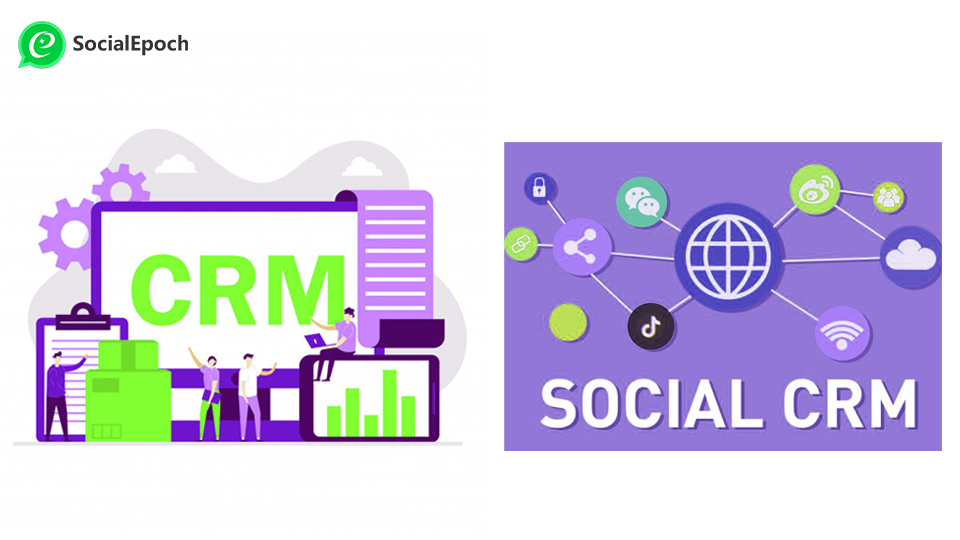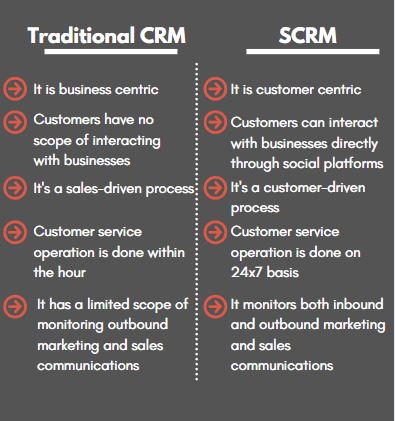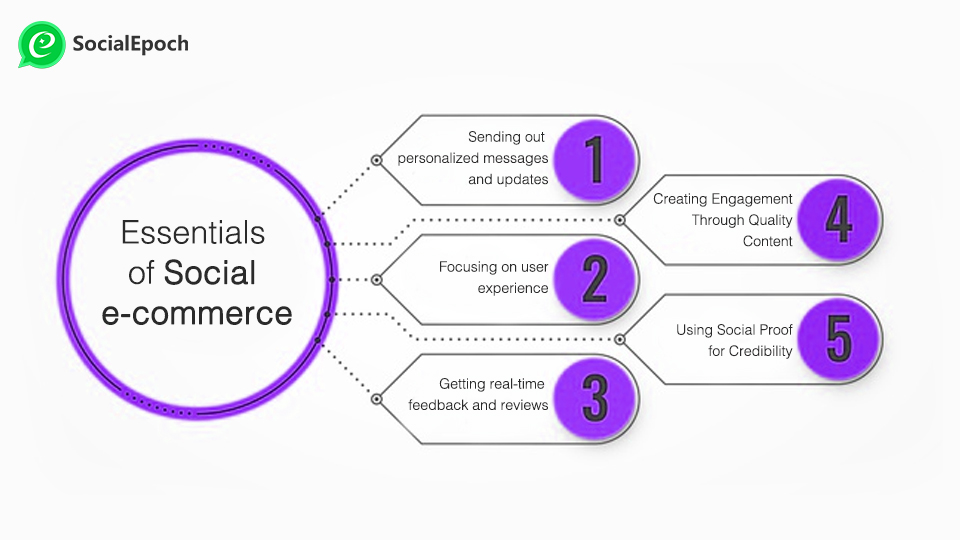Customer relationship is the heart of any business. If a person has a good experience with your business, they are bound to share their experiences with others in person or on social platforms. This builds a positive brand image for you and helps bring in more customers. But on the contrary, a person sharing a bad customer experience will cost you several new as well as existing customers. Good customer relationship management can help boost your business in no time.
As new technologies are taking center stage in marketing, customer relationship management (CRM) too has evolved with time. Here is a comparison between traditional CRM and SCRM.
CRM v/s SCRM: The Difference

Traditional CRM:
A traditional CRM deals with collecting and managing customer data and engaging in direct advertisements. A traditional CRM involves reaching out to customers through e-mails, phone calls, and personal interactions.
Traditional CRM requires businesses to create a unique profile for each of their customers to keep track of the interactions, purchase history, personal details, and more. These data are used for analyzing customer behavior and improving customer experience.
Beyond analyzing prospect behavior at the individual level, CRM software also provides overarching metrics on types of outreach, such as how many outbound calls the sales team has made for the month, or which campaigns and offers are closing the most deals. These company-wide reports give an insight into the sales process and pipeline as a whole, plus they can identify ways to retain existing customers or upsell them on other products or services.
SCRM:
Social Customer Relationship Management or SCRM pertains to social engagement and communicating with customers directly. Unlike traditional CRM, SCRM focuses more on customer experiences and what they say about the business on social platforms. Businesses prefer SCRM to get closer to customers and capitalize on the chatter around their brands, products, and services.
Through Social CRM, businesses can turn their social networks into customer service touchpoints. Instead of setting up automated call centers, businesses can interact with customers directly through social platforms.
SCRM is more dynamic when it comes to sales, advertisements, and customer services and helps businesses build a strong relationship with customers.

What is Social e-commerce?

Social e-commerce is the use of social media platforms to make a more personalized and targeted shopping experience for buyers. Social media makes it easy for e-commerce businesses to find potential customers based on their online activity and suggest product recommendations accordingly.
Social media platforms such a Facebook business, Instagram, Pinterest, and Whatsapp Businesses offers features that help in increasing sales, driving traffic, increasing customer engagement, and website traffic
Social e-commerce and SCRM
Social e-commerce has a significant advantage over other e-commerce platforms as it provides a common space where buyers can shop as well as share their brand experience.
Social media makes it easy for customers to share their experiences and recommend a brand if they are satisfied with your business. Social media plays an important role in word-of-mouth marketing and make content viral in no time.
For businesses, social media acts like an SCRM tool. It becomes quite convenient to keep track of what people are talking about their brand. Creating a buzz for upcoming features, creating polls, and getting feedbacks, solving customer service queries, all can be managed easily, and almost instantaneously.
Essentials of Social e-commerce

There are certain factors that differentiate a successful business from an average one. Though the marketing approach varies from business to business based on their products, here are a few essentials of a successful social e-commerce business:
1. Sending out personalized messages and updates
Customers appreciate businesses that acknowledge them and participate in personal communications. Keeping them in touch through personal messages or regular product updates makes the customer feel special and they usually stick around with the business longer. For e-commerce businesses, customizing messages based on your customer’s interests and previous purchase history helps businesses generate more sales.
2. Focusing on user experience
You should always focus on understanding your customers and know about their likes and dislikes. You can do this by creating polls on social media sites or interacting with them personally. By knowing your customers better, you can work on improving user experience and retain customers for a longer period of time.
3. Getting real-time feedback and reviews
Knowing what your customers feel about your product first hand is the biggest advantage of social media. Real-time feedback through social platforms can help businesses serve their customers better and also get the opinion about future products and possible scope of improvement. Positive feedback can help you build a positive brand reputation and bring in more customers while negative ones can affect your existing as well as future customers.
So, the trick is to always respond to negative feedback with a positive reply and work on issues to avoid negative reviews.
4. Creating Engagement Through Quality Content
With hundreds and thousands of brands competing for attention from your customers on social media platforms, it becomes necessary for you to stay relevant at all times. By keeping your customers engaged through content that they can react to or engage with, you can make sure that they always have the same level of interest in your brand.
5. Using Social Proof for Credibility
‘Seeing is believing’. This is true even for e-commerce. People who can see or experience the product before buying have higher chances of actually purchasing it than those who don’t. Share product videos, demos, or customer testimonials on social media platforms. This can help you build credibility for your product and make it easier for new customers to trust you.
WhatsApp as a CRM Tool

When it comes to popularity, WhatsApp beats all other social media apps. WhatsApp has a very diverse user base and is a preferred messaging platform for all age groups. It also has the highest message open rate of 98%. These facts make WhatsApp an ideal social platform for businesses to connect with their audiences.
Businesses are using WhatsApp as a CRM tool as it helps them connect with their customers on a personal level. With WhatsApp CRM, businesses can now provide in-time responses to customer queries and deliver more efficient post-sale services.
WhatsApp SCRM tools help businesses in managing large customer base, and interact with them using bulk messaging, quick reply features, and provides them with analytical data as well.
Application scenario of SCRM in social e-commerce
Here is how SCRM adds value to social e-commerce businesses:
1. Making the business case for Social CRM
One of the main applications of SCRM in social e-commerce is the integration of business functions. It allows sales, marketing, and customer support all to cooperate in an infrastructure based on the individual customer.
2. Sales- revenue and loyalty benefits
Customers recommending a particular brand to a large group of people can help sales teams see improvement in their retained and referred business. Recommendations generate leads and that leads to increased revenue and higher brand loyalty.
3. Marketing – increased reach and visibility
Marketers can use SCRM to increase reach and cut costs while improving customer tracking and measurement. In a recent survey, 89% of respondents said social media increased their brand’s exposure. While nearly half reported that spending just 6 hours a week on social media activity reduced overall marketing costs.
4. Customer service – a circle of lower costs and higher satisfaction
SCRM helps businesses track and manage customer contacts across multiple channels and business functions, and customer service teams. This helps them improve on their customer services and customer experiences dramatically.
5. Enhanced Marketing and Promotion
SCRM and e-commerce integration offers business owners a common location for their sales as well as customer data. This improves efficiency in all marketing activities such as planning, targeting, and executing any new idea.
SCRM helps actuate effective social commerce strategies. But it also requires a careful and well-planned link between social media content and the route devised for lead generation. The pillars of this strategy are high-quality content, user engagement, credibility, and a convenient payment process. If you get this combination right, you can drive massive sales through your social media profiles.















